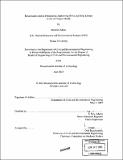Desalination and its potential for harnessing brine and solar energy in the US Virgin Islands
Author(s)
Miilu, Michelle, 1975-
DownloadFull printable version (5.668Mb)
Other Contributors
Massachusetts Institute of Technology. Dept. of Civil and Environmental Engineering.
Advisor
E. Eric Adams.
Terms of use
Metadata
Show full item recordAbstract
A review was conducted of potential methods for achieving desalination sustainability with specific reference to the US Virgin Islands. Thermodynamic efficiency, industrial ecology, and renewable energy were assessed for their application in desalination and contextual relevance to specific desalination processes. Renewable energy was determined to provide the greatest near-term potential for moving towards sustainable desalination. High desalination energy requirement and near-complete dependence on fossil fuels, the applicability of renewable energy to any desalination process and the advanced level of renewable energy technologies were key factors in this determination. An analysis was then performed of three renewable energy technologies for a mechanical vapor compression desalination plant on St. John, USVI. Solar pond, photovoltaic, and wind turbine energy were evaluated for their feasibility and the benefits towards sustainability they provide. Wind turbine energy was determined most suitable for the St. John plant in both respects.
Description
Thesis (M.Eng.)--Massachusetts Institute of Technology, Dept. of Civil and Environmental Engineering, 2003. Includes bibliographical references (leaves 42-46).
Date issued
2003Department
Massachusetts Institute of Technology. Department of Civil and Environmental EngineeringPublisher
Massachusetts Institute of Technology
Keywords
Civil and Environmental Engineering.